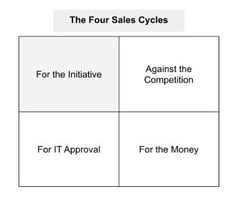How to Handle Objections
No, I don’t need one. No, I don’t want one. No, I already have one. No, my IT team can build one. These and a myriad of other objections are claimed every day — so what’s the best way to mitigate and overcome sales objections?
 Of course, all objections (at least on the surface) are legitimate objections that need to be addressed and should never be summarily dismissed. Empathy is the most valuable trait that a salesperson can demonstrate; it is critical that the customer feels your genuine interest in responding to his/her questions (objections). However, some questions/objections are merely clarification requests and can be quickly and crisply remedied. While these objections shouldn't be merely shrugged off, you need to be careful not to overreact, either. I have often witnessed salespeople not really understand the question and launch into some long winded, defensive response when a simple "yes" or "no" would have sufficed.
Of course, all objections (at least on the surface) are legitimate objections that need to be addressed and should never be summarily dismissed. Empathy is the most valuable trait that a salesperson can demonstrate; it is critical that the customer feels your genuine interest in responding to his/her questions (objections). However, some questions/objections are merely clarification requests and can be quickly and crisply remedied. While these objections shouldn't be merely shrugged off, you need to be careful not to overreact, either. I have often witnessed salespeople not really understand the question and launch into some long winded, defensive response when a simple "yes" or "no" would have sufficed. Simply stated, these three easy to follow steps will help you overcome all objections:
- Step one: ensure that you, as the salesperson, truly understand the question (also known as qualifying the objection). The easiest approach is to repeat the question back to the customer and, if necessary, ask the customer for an example of the situation for which he/she is asking.
- Step two: answer the question directly and, if relevant, the reason for your answer. Nothing feels worse than asking a question and receiving a double talk non-answer in response (similar to the approach taken by many politicians). If, for some reason, you are unable to answer the question (perhaps you need another internal resource for direction), just confess. No customer expects any salesperson to be able to answer every possible question. Of course, you can't defer every answer and remain credible, so I suggest using this approach judiciously.
- Step three: verify that the question has been answered adequately and that the objection has been overcome. Sometimes, when verifying that the question has been answered, we find that the question has not been sufficiently answered, so this step provides a second opportunity to properly respond.
I predict that if you practice this simple three step method for responding to questions/objections as part of your sales process execution, you will put yourself in the best possible position to win. If your sales team would like more coaching as it relates to overcoming objections, ask Virtual Dave or email dave@moicpartners.com.



